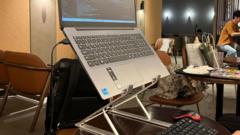In the lively district of Daechi, Seoul, local cafes face a new challenge stemming from a cultural phenomenon known as "Cagongjok." This term refers to primarily young South Koreans who prefer studying or working in cafes, leading to conflicts over seating as customers occupy tables for extended hours without making frequent purchases. Hyun Sung-joo, a 33-year-old developer and cafe owner, shared his frustrations about one customer who set up an office-like setup in his Starbucks, complete with two laptops and a six-port charger. "I ended up blocking off the power outlets," he explained, recognizing the impact of high rents on his business when seats are occupied all day.
The situation isn't unique to one cafe; studies and work in cafes have surged nationally. Starbucks Korea announced new guidelines to address instances where customers set up elaborate workstations or leave tables unattended for prolonged periods. The chain emphasized that while their staff would provide guidance, they wouldn't forcibly eject customers. They intend to maintain a balanced environment and minimize distractions for other patrons.
Despite the new measures, many "Cagongjok" still frequent these cafes, seeking an atmosphere that allows for focused study. An 18-year-old student preparing for university entrance exams expressed how deeply integrated her cafe visits are into her daily routine, often staying for nearly 12 hours at a time and sometimes leaving her belongings unattended while she travels for meals.
Reactions to Starbucks' restrictions have been mixed. While some patrons welcome this move as a necessary step to ensure fair access to seating, others feel it signals a shift from the relaxed, welcoming environment previously offered by the chain. This debate also taps into a larger societal discourse in South Korea, where the number of coffee shops has skyrocketed to nearly 100,000 in recent years, leading to an increase in competition for space and resources.
Different cafes are employing varying strategies to handle the situation. While some embrace Cagongjok and understand their need for a study-friendly space, others have implemented stricter rules. One cafe owner in Jeonju has introduced a "No Study Zone" policy, limiting study sessions to two hours, leaving room for guests utilizing the cafe for conversation and leisure.
For many young people, like 29-year-old Yu-jin Mo, cafes provide a safe harbor away from less comfortable environments like libraries or their own homes. Multiple factors shape this need, including academic pressures and social isolation. Experts like Professor Choi Ra-young of Ansan University note that the Cagongjok movement reveals deeper societal issues surrounding access to suitable study environments.
"If we want to incorporate this phenomenon realistically," Professor Choi argues, "we need guidelines that create equitable spaces in cafes for everyone." The ongoing conversation about Cagongjok challenges cafe owners and society alike to find a balance between commercial viability and community support in an ever-evolving cultural landscape.

















